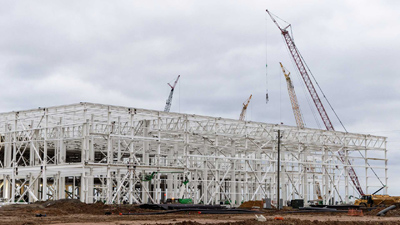Ford received a huge $9.2 billion loan from the U.S. Department of Energy’s (DOE) Loan Programs Office (LPO) for the construction of three manufacturing plants that will produce batteries for EVs built under the Ford and Lincoln brands.
The loan is the biggest the U.S. government has awarded to a carmaker since the 2009 bailouts, according to Bloomberg---more than triple the $2.5 billion loan received by General Motors last year.
Ford will use the money to build the so-called BlueOval City project in collaboration with cell maker SK Innovation, spawning two battery-producing facilities in Central Kentucky and a third in West Tennessee.
All three sites are expected to go online in 2025, with a combined capacity of 129 gigawatt-hours annually, contributing to Ford’s plan to assemble around 2 million EVs per year by 2026---a massive ramp-up compared to the roughly 132,000 units it made last year.
The end goal of this undertaking is to build a reliable domestic supply chain while reducing America’s reliance on China when it comes to building EVs, while also leading to more Americans gaining access to the government’s $7,500 tax credit for U.S.-built EVs.
As of today, the Ford F-150 Lightning pickup is the only vehicle in the Blue Oval's lineup that qualifies for the full tax credit, while the Mustang Mach-E and E-Transit are only eligible for a $3,750 credit.
Of course, the government’s plan to ramp up EV adoption in the U.S. by offering huge low-interest loans to automakers and tax credits to buyers of American-made EVs is supported by taxpayers' money.
When the three facilities become operational in 2025, they’ll create roughly 11,000 new jobs for Americans, with 6,000 positions expected to become available in Stanton, TN, and another 5,000 in Glendale, KY.
Ford’s six-square-mile manufacturing complex in Tennessee will also be home to an EV plant that will churn out 500,000 vehicles per year, including the company’s next-generation pickup truck, codenamed T3.
Combined, the three battery-making sites and the EV manufacturing facility will have an estimated price tag of $11.4 billion.










Abby Andrews